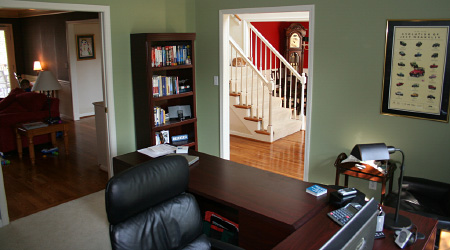Tax Write Offs For A Home Business

Running your own home based business means being your own boss but it also means taking tax write offs to lower the amount you owe the government at the end of the year. Home-based businesses though raise a number of red flags with the Internal Revenue Service as they look for abuses and excesses deductions. Understanding what you legally can and cannot claim is important to not only stay out of trouble with the IRS but it is also a moral and ethical responsibility.
If you're one of the many millions of home owners who use one of the rooms in your house as a base of operations for a small business then you can deduct a portion of the expenses on your tax return. The key is that the space used must be exclusively for the business and not handle any personal tasks. If even a small portion of time or space is used in a personal capacity it will not qualify legally as a business office. Another consideration is that the space used must be where most of the work is conducted. For individuals who provide customer support or write for a living then this probably won't be an issue. Some businesses though take the owner off-site for a majority of the day. Even in this circumstance however, if you hold business meetings, pay bills and file paperwork and a significant portion of other business activities may still qualify the space for business use. The amount written off is a percentage amount of the space used in relation to total square footage. So if the business office is 25% of the total square footage then that amount can be written off such as rent, homeowners insurance, property taxes and utilities etc.
Now that a space has been provided to conduct business it is time to look at some of the most common office deductions and tax write offs for home-based businesses. Anything that would be purchased for normal business operations in any office is a common tax write off. These items include but are not limited to telephone expenses such as work cell phones and 800 numbers. You can also write off a computer, printer, copier, fax and other electronics if they are used exclusively for business operations. Office furniture such as a desk and chair or filing cabinets also qualify since they would be needed in any office. You can't have an office without office supplies so pens, paper, folders, calendars, tape, paper clips and other miscellaneous items can be deducted. Business travel qualifies as a tax write off. The Internal Revenue Service uses the measure of so many cents per mile when claiming a driving deduction. Be sure to use a mileage log to record all trips, starting and ending odometer readings and total miles driven with receipts for gas.
Tax law in general can be quite complicated so it is best to consult with a certified public accountant or other experienced tax professional which deals with home businesses. While there are many tax write offs for a home business sometimes individuals claim deductions which don't qualify leading to an audit resulting in penalties and interest on the amount owed. Extensive information is provided at www.IRS.gov including publications and detailed questions and answers. If you are not sure if something qualifies as a tax write off then error on the side of caution and don't claim a deduction unless you can verify first.







